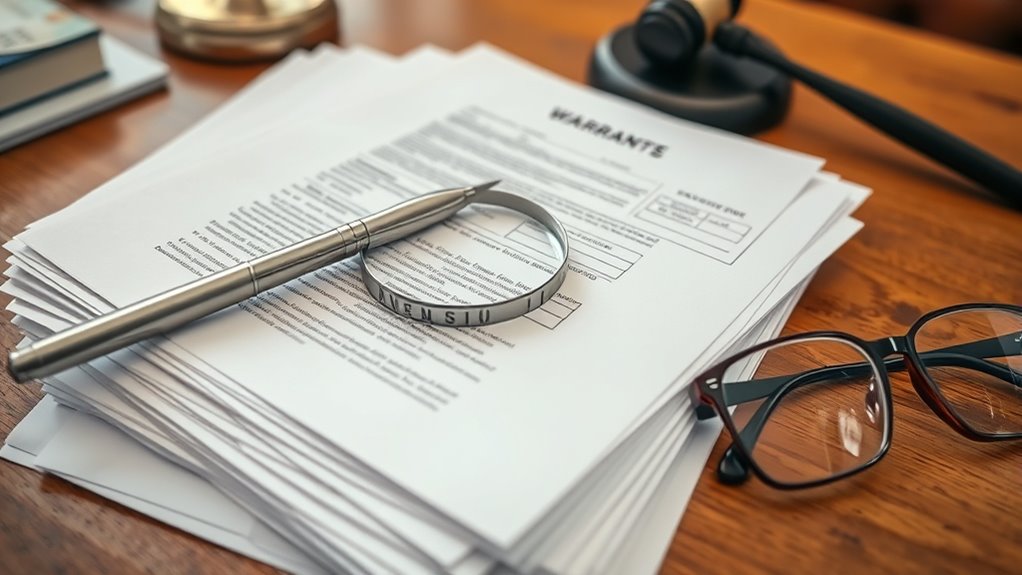When judges decide whether to issue a warrant, they rely on a sworn affidavit that details the reasons and evidence supporting probable cause. This document includes specific observations, facts, and evidence showing a crime is likely committed or evidence is present. It must be precise, thorough, and sworn under oath. The judge reviews this paperwork carefully to make certain it meets legal standards. To learn more about how this process works, keep exploring these important details.
Key Takeaways
- A sworn affidavit detailing probable cause and supporting facts for the suspected crime or evidence.
- Specific information about the location, date, time, and description of the evidence or suspect.
- Evidence-based observations or circumstances that justify the need for a warrant.
- The affidavit must be signed and sworn under oath before the judge.
- The judge reviews the affidavit to determine if probable cause exists before issuing the warrant.

Have you ever wondered what warrant paperwork is and why it matters? When law enforcement needs to search your property or make an arrest, they can’t just do so on a whim. They must follow a legal process that involves submitting specific documents to a judge. This paperwork is vital because it ensures that the officer’s actions are grounded in legal authority, respecting your rights and maintaining the integrity of the justice system.
The core document that a judge reviews when issuing a warrant is usually an affidavit. This affidavit is a sworn statement that provides a detailed account of why law enforcement believes there’s probable cause to justify the search or arrest. Probable cause is a legal standard that requires more than mere suspicion but less than certainty. It means that there are sufficient facts and circumstances that would lead a reasonable person to believe a crime has been committed, or that evidence of a crime is present at a specific location. When preparing this affidavit, officers must include concrete facts, observations, or evidence that support their claim of probable cause.
To meet affidavit requirements, law enforcement officers must be precise and thorough. They typically include details such as the date, time, and location of the observed activity, descriptions of the suspect or evidence, and any relevant context that ties the facts together. The affidavit must be sworn under oath, affirming that the information provided is truthful and accurate. This sworn statement is essential because it provides a legal foundation for the judge to evaluate whether the probable cause exists. Additionally, understanding the warrant process helps ensure that law enforcement actions remain within the bounds of legal standards and protections.
Law enforcement must include detailed, sworn facts to justify probable cause in warrant affidavits.
Judges rely heavily on this paperwork because their role is to safeguard constitutional rights while enabling law enforcement to do their jobs effectively. When reviewing warrant applications, they scrutinize the affidavit to ensure it meets all legal standards. The judge’s primary concern is whether the officer has provided enough factual basis—supported by evidence—to justify issuing the warrant. If the affidavit convincingly demonstrates probable cause, the judge will sign the warrant, authorizing the search or arrest.
Frequently Asked Questions
How Long Does It Take to Get a Warrant Approved?
Getting a warrant approved can vary depending on the circumstances and judicial procedures. Typically, it takes a few hours to a day if the situation is urgent, but non-emergency warrants might take longer, sometimes days. Your request goes through judicial procedures where a judge reviews the evidence, and warrant approval depends on the clarity and legality of the information provided. Always plan for some variability based on case complexity.
Can Warrants Be Issued Electronically or Only in Person?
Warrants can now be issued electronically through remote issuance, making the process faster and more efficient. Judges often use digital signatures to authorize warrants without needing in-person appearances, especially in urgent cases or when remote technology is available. This modern approach streamlines the process, allowing law enforcement to obtain necessary warrants swiftly while maintaining legal integrity. So, yes, warrants can be issued electronically, utilizing digital signatures and remote issuance methods.
What Are the Common Reasons for Warrant Rejection?
Warrants can be rejected for reasons that hit like a brick wall, especially if there’s no probable cause or if the judge feels the evidence isn’t solid enough. Judicial discretion plays a big role here, as judges assess whether the warrant request meets legal standards. If paperwork is incomplete, misleading, or lacks specific details, your warrant application could be denied, so thorough and honest documentation is essential.
Do Warrants Vary Between Federal and State Courts?
You’ll find that warrants do differ between federal and state courts mainly because of different standards for probable cause and warrant validity. Federal courts often require stricter evidence and detailed affidavits, while state courts might have more flexible procedures. Despite these differences, both types of courts must guarantee the warrant is supported by probable cause and remains valid, or it could be challenged or rejected.
Can a Warrant Be Challenged or Appealed After Issuance?
Yes, you can challenge a warrant after issuance. You have the right to question its validity through judicial oversight, especially if you believe there was a lack of probable cause or procedural error. If the warrant was improperly issued, you can file a motion to suppress evidence, which may lead to its dismissal. Courts review warrant validity to guarantee legal standards are met and protect your constitutional rights.
Conclusion
Think of warrant paperwork like a key to a locked door—you need the right document to open it. Without proper paperwork, judges can’t grant access, much like trying to enter a house without a key. Remember the story of a detective who almost lost an essential case because he skipped a step in the paperwork process. That’s why understanding these forms is imperative—they’re the keys that unseal justice and keep the process fair and lawful.









